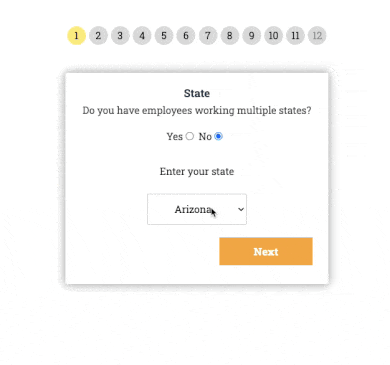

Texas employee handbook overview
When it comes to building your Texas employee handbook, you must be sure to include both state-specific and federal policies. Whether all of your employees are based in Texas or only a handful, you will need to provide a Texas-specific handbook to ensure your employees know the policies and rights entitled to them by their state.
Find the required state policies for Texas, federally required policies, and other optional policies below.
What should be included in a Texas employee handbook?
While there are many policies required for all states that you will need to include in your Texas Employee Handbook, below are policies that Texas specifically requires employers to include in their handbooks.
- Texas Employment at Will Policy: Texas is an employment-at-will state. If there is no binding contract of employment, either the employer or the employee can adjust the terms and conditions of employment or terminate the relationship. This can be for any reason or no reason, as well as with or without prior notice.
- Texas Final Pay Policy: Texas has special requirements for when an employer must provide the employee with their paycheck, depending on how the employment came to an end.
- If the employee is terminated: within six days
- If the employee quits: by the next regular payday
- If the employee dies: to the executor of the state if that is available
- It is prohibited to withhold a final paycheck past these deadlines for any other reason, such as but not limited to, failure to return company property or sign timesheets. If the employer knows or should know what the pay should be, it must deliver the final pay no later than required by law.
- Texas Military Leave Policy: Employers are required to provide military leave policy protections for employees who are deployed for service.
- Texas Voting Leave Policy: Employers are required to provide employees with paid leave for voting on election days if the employee does not have at least two consecutive hours outside of their working hours.
- Workplace Privacy Policy: Texas requires that employers inform employees that company-provided devices, business communications, and business activities may be monitored by the company.
- Texas Day of Rest Policy: Employers are required to provide one day of rest for every 7 days worked for certain eligible retail employees.
- Jury Duty and Court Attendance Leave: Companies must provide leave for any employee summoned to attend a judicial proceeding in response to a subpoena in any court when the process requires the employee's attendance, including jury duty or juvenile court proceedings when required as a parent or legal guardian.
Create your Texas employee handbook now
Federal Policies
Don’t forget about federal policies
There are policies that should be included in every handbook to comply with US labor and employment law. Many states require additional provisions. However, this list includes core federal requirements and best practices applicable to most businesses.

Core federal policies
- Equal Employment Opportunity and Anti-Discrimination Policy Show me!
- Anti-Harassment and Complaint Procedure Show me!
- Family Medical Leave Act (FMLA) Policy Show me!
- Americans with Disabilities Act (ADA) & Reasonable Accommodation Policy
- Military Service Leave (USERRA)
- Wage and Hour Compliance Policy (FSLA)
- At-Will Employment Notice Show me!
- Polices if you employ federal contractors (Pay Transparency Policy, Whistleblower Protection, Drug-free Workplace Policy)
Highly recommended policies
- Workplace Violence Prevention Policy
- Code of Conduct Policy
- Nursing Parents Policy
- Conflict of Interest and Business Ethics
- Disciplinary Procedures
- Use of Company Property
- Employee Classification and Pay Practices
- Health and Safety Policy
- Confidential Company Information
- Open Door Policy
- Receipt of Non-Harassment Policy
- Use of Communication and Computer Systems
- Workplace Searches and Inspections
Additional policies to include
- Industry-specific policies
- Sick Leave, Vacation Leave, PTO policy
- Company Vehicles Policy
- Punctuality and Attendance
- Benefits
- Working Schedule
- Employment Records
- Smoking
- Overtime
- Performance Reviews
- Social Media Policy
- Remote Work Policy
- Introductory Period Policy
- References
- Hiring Relatives and Significant Others
- Business Expense Reimbursement
Get all recommended policies from the free handbook builder.
Subscribe to receive updates on state and local policies in your inbox.
Texas labor law posters
Understanding labor law poster requirements can be a bit like trying to decode a complex puzzle. You need to comply with both state and federal requirements.
Why Should I Care About Displaying Posters?
You might be wondering why it's so important to display these posters in the first place. State and Federal laws mandate that employers must have up-to-date labor law posters conspicuously displayed for their employees. Failing to do so not only results in steep fines (up to $35,000 in federal fines and additional state fines) but also exposes you to real liability.
Consider this scenario: if an employee decides to bring a lawsuit against your company, and you don't have the required posters or they are outdated, you could face even more significant problems:
- Statute of Limitations: Normally, there's a limited window within which an employee can file a lawsuit against you. However, if you didn't inform your employees of their rights through proper poster display, a court might decide that the statute of limitations doesn't apply.
- Operating in Bad Faith: Courts may determine that you were intentionally withholding information from your employees, which could lead to a finding that you were operating in bad faith. This can substantially increase your liability.
What Are the Requirements for Displaying Labor Law Posters?
Labor law posters must be displayed at every physical location where you have employees, and they need to be conspicuously displayed for all to see.
- If you have a hybrid workplace with both in-person and remote employees, you'll need physical posters at your facilities and electronic distribution to your off-site workers.
- For fully remote companies, you can distribute posters electronically by sharing a permanent link to the appropriate posters.
- Some posters also need to be visible to job applicants, such as FMLA, Equal Employment Opportunity, and Employee Polygraph Protection posters, as per the guidance provided by the Department of Labor.
What Labor Law Posters Do I Need to Display?
You'll need both Federal and State labor law posters for each state where you have employees. The good news is that all the posters you need are provided for free by the federal government and state departments of labor. You've probably seen those convenient "all-in-one" laminated posters, but if you prefer, everything you need is also available as a free, printable document from the Texas Department of Labor.
Federal Poster Requirements
Determining which federal posters you're required to display can be influenced by various factors, including your industry, the size of your company, benefits you provide and union affiliation.
The good news is that there's a handy tool to help you understand precisely which federal posters your company needs. You can use the Federal Poster Advisor tool to determine your specific federal poster requirements.
Texas Labor Law Poster Requirements
You can refer to the Texas Department of Labor for free, printable posters.
Download Texas labor law posters hereWhat’s included with the handbook builder
Creating a new handbook only takes a few minutes. And it’s easy. You can get started by answering a few interactive questions about your company. A few examples:
- How many employees do you have?
- Do you have employees in multiple states?
- Do you have an introductory period for new employees?
- Do you offer paid holidays?
- What is your payroll schedule?

Communicating your company culture
In all businesses, building a strong company culture can be essential to boosting morale and aligning employees. Arguably, it is even more key for small businesses. With a small team, the impact of a strong culture is made more apparent. Here are some important things to remember when building a strong company culture.
Evaluate Your Current Culture
Since company culture is primarily determined at the top, here are some key questions to ask your leadership team to evaluate where your culture currently stands:
- Are we open about how things work at our company?
- Do our employees know what is expected of them?
- Do we value our employee’s feedback?
- How do we demonstrate that our employees are valued?
- What are our company values?
- Do we clearly express these values?
Set Your Goals
From your answers to the previous questions, pinpoint what is lacking and make goals to improve on those areas. This could mean having clearer communication for employee expectations, defining company values, or creating monthly team-building activities to build morale.
Respecting Employee’s Work-Life Balance
A large part of communicating that your company values its employees is demonstrating respect for their lives outside of work. A strong employee handbook can allow this to be done in a clear, effective way. Company leaders should detail expectations, but also be open about their own work-life balance to build transparency. Trust is key in a great company, and when leaders show genuine empathy for employee responsibilities at home, a foundation for transparency and cooperation is built.
The Link Between Culture and Happiness
Many surveys and analyses of employee feedback indicate that the majority of employees care as much about the culture of the company they work for as their salary. In small companies, culture is frequently undervalued. In order to reduce turnovers and increase recruitment, companies need to understand that there is a link between strong culture and the one important question employees think about regularly: “Am I happy working here?”.
Understanding and Communicating Your Company’s Culture
In order to effectively communicate your company’s culture, you need to understand it. By asking your team the right questions, setting goals, and valuing employees, you can be sure to be on the right track.
Communicating this culture is an essential next step toward aligning with your employees. Not every culture is a good fit for every employee, and being honest upfront is important for making sure you are hiring employees best aligned not only with the skills a company requires, but the culture of the workplace. Research shows that when looking for a job, 77% of people polled would consider a company’s culture and work atmosphere before applying. By clearly communicating your company culture up front, you can ensure that more candidates who align with your team values will apply for a position.

Still have questions?
Can’t find the answer you’re looking for? Please chat with our friendly team.
Contact UsEmployee Handbook Resources
Best practices, guidance and information for companies





